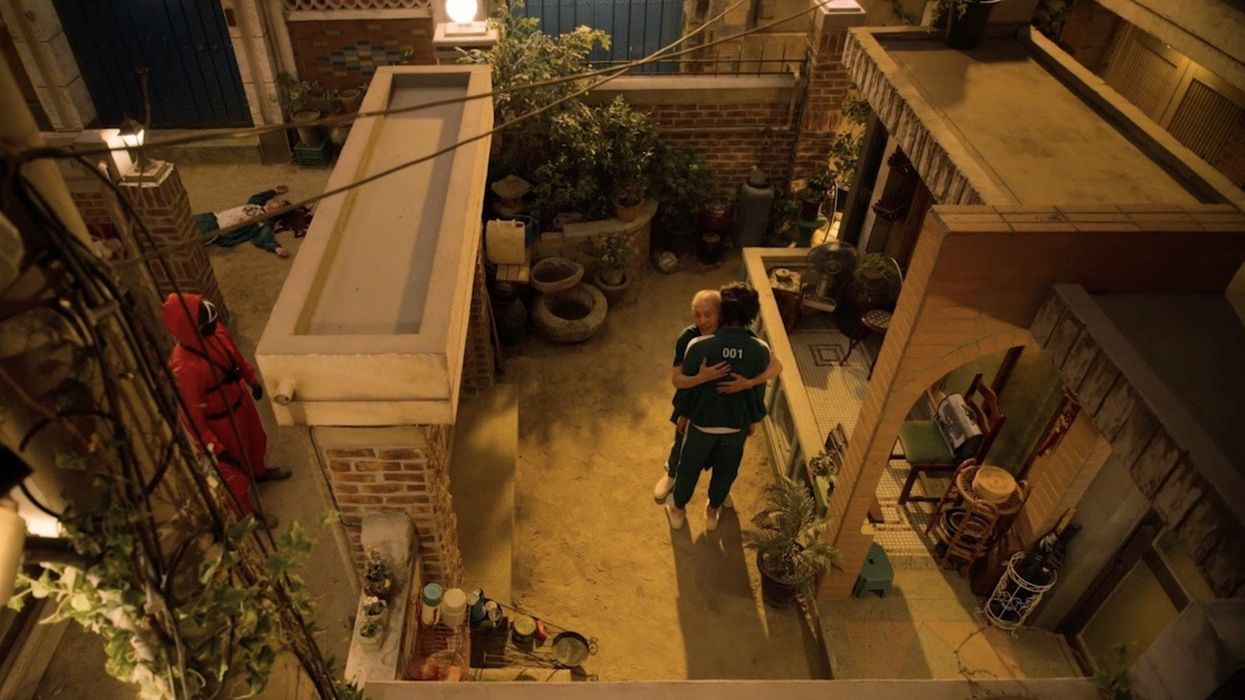The Most Pivotal Scene in 'Squid Game,' and How They Shot It
Finding a balance between intimacy and horror is not an easy task. This is how this cinematographer did it.

In 2021, Squid Gametook the world by storm. The South Korean survival drama series revolves around a contest where 456 players have a chance to win a large cash prize by risking their lives to play a series of deadly children’s games. By taking something innocent and integrating it with class and economic disparities, creator, writer, and director Hwang Dong-hyuk brought a gripping story that shook us to our fundamental cores.
While Dong-hyuk’s creative direction made a show unlike any other, Emmy-winning cinematographer Lee Hyung-deok helped create a surreal visual landscape that made Squid Game look like nothing else. Hyung-deok’s cinematography established an empathetic perspective of the fake world these players entered.
Hyung-deokbreaks down his approach to filming the emotional climactic moment between Seong Gi-hun (Lee Jung-jae) and Oh Il-nam (O Yeong-su) in Episode 6, "Gganbu." You can watch the full video here.
"Gganbu" cinematography
As the players are nearing the end of the fourth game, the fake world is lit by a sunset that is captured with a Horizont, which Hyung-deok notes isn’t commonly used these days. Typically, filmmakers use a CGI sunset like The Mandalorianor shoot practically in the setting sun, but using the panoramic Horizont helped Hyung-deok establish an imbalance and unfamiliarity of the “fake world” rather than going for a realistic look.
Having this surreal sunlight helps to create a sense that something innocent is lost. The strong contrast of color and red hues, the location, and the nature of the game emphasize this as well, but Hyung-deok finds a deeper meaning.
“Generally, the sunset means children must go home, but they are usually reluctant since they want to play more,” Hyung-deok says. “Playing games is one of the biggest joys of childhood, and I think the sunset evokes nostalgia of how time fades, which is fitting for this alleyway scene.”
As Il-nam enters what he believes to be his childhood home, Hyung-deok follows him with a handheld camera with a telephoto lens. The handheld camera not only allows Hyung-deok to create an intimate space between the two friends in their final moments but to capture Gi-hun’s anxiety and wavering emotions. Although shadows mask Il-nam’s face, Gi-hun’s face is lit by the red hue of the sunlight, which makes every facial expression visible to the audience.

This scene is the height of Gi-hun’s psychological state of mind during the show. It is the moments that end up being the most traumatizing, helping shape who his character will become.
As Il-nam reveals that he is aware of what is happening, Hyung-deok shifts from a handheld to fixed, adding weight to the impact of the moment. The camera then goes to a high angle, removing the audience.
When Il-nam hands the final marble to Gi-hun, the camera comes in for a close-up to reveal Gi-hun’s emotional state as he lifts his face back into the light. Il-nam’s expression is still hidden by shadows, making it hard for the viewer to understand what he is trying to convey as he says “gganbu.”
Hyung-deok doesn’t prefer close-up shots that don’t show space, but this scene needs an intimate camera that captures this emotionally shifting moment.
“I ended up using a lot of close-ups because each wrinkle and each tear from these experienced actors helped convey the story effectively,” Hyung-deok says.
Hyung-deok takes us out of the moment with a high-angle wide shot that reveals the masked man waiting in the corner, bringing us back to the jarring realization of what is to come. As Gi-hun leaves, the camera tracks him as he walks past the alley of dead bodies.
In the final high-angle shot, Hyung-deok wanted to establish the idea that those who survived are leaving a fake world behind.

“Gganbu” is a heartbreaking episode. It is the emotional climax of the show, as it humanizes these challenging moments and decisions made. Hyung-deok’s ability to help translate and capture these fine moments of emotional conflict adds greater weight and impact to the story.
Hyung-deok’s work is tender, but it doesn’t forget about what is happening around the characters. This moment exists in the context of a larger and more brutal world, and that is the horrifying beauty of Squid Game.
What are your favorite shots or sequences from Squid Game? Let us know why you love them in the comments below!
Source: Still Watching Netflix

 "'Back Home"via Mercedes Arutro
"'Back Home"via Mercedes Arutro 'Back Home'via Mercedes Arutro
'Back Home'via Mercedes Arutro 









